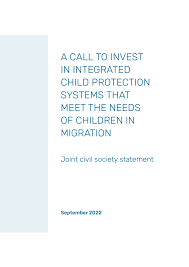
https://www.terredeshommes.org/wp-content/uploads/2022/09/ICM-Joint-civi...
We welcome the 14th European Forum on the rights of the child this year dedicated to ‘Bringing children at the centre: empowering, protecting and including children’, and its focus, amongst other things, on integrated child protection systems.
As organisations working on fulfilling the rights of children in displacement and migration, we underline the EU Child Rights Strategy’s commitment to fulfilling the rights of all children, and recall the importance of the Commission’s initiative to strengthen child protection systems.
The situation of children arriving to, and residing in, the European Union is a litmus test for European child protection and migration management systems and how their urgent needs for information, support, assistance and protection can be met.
Developments over the last years have placed children increasingly unprotected and at risk of abuse, violence, exploitation, being separated from their families, and going missing. In the worst of cases, Europe has witnessed hostile migration control and enforcement measures being applied in a way that excludes vital human rights and child protection safeguards, including pushbacks, detention and lack of durable solutions for children with an insecure residence status.
Recent years have also held the huge challenges of dealing with Covid-19 disruptions, which left many children in migration separated from their families and/or without access to usual support. In 2022, Europe experienced the massive displacement of children fleeing Ukraine.
The triggering of the EU Temporary Protection Directive, which mandated amongst others access to accommodation, education and health services for Ukrainian children, constituted an important achievement for the EU. However, while measures are being put in place to welcome refugees from Ukraine, this development of parallel protection systems within the EU for persons fleeing wars now leads to unequal treatment for refugee children from different countries.
1 It is essential that we learn from this response to see how to focus on better meeting the needs of all children in migration. Looking ahead, there can be no doubt that further challenges like climate crisis and the energy crisis will significantly affect displacement and migration and the lives of displaced and migrant children in and around Europe. These challenges can impact people’s decisions to migrate, and society’s capacity to include newcomers.
Moreover, migrant children and their families may not have the resources to cope with future societal challenges, in part because third country nationals and their children in the EU live at much higher risk of poverty than the general population.2 Consequently, we call on the EU to stay committed to protecting children in migration3 , as they face complex challenges their peers may not. The initiative to strengthen integrated 1
As an example, the briefing ‘GREECE: A two-tier refugee system’ prepared by the Greek Council for Refugees, Oxfam and Save the Children shows how the Greek government is operating “a two-tier refugee response” - one for Ukrainians and one for all other refugees.
2 EUROSTAT data from 2019 confirms that there is a 39 percent risk among migrants to find themselves in conditions of poverty or social exclusion, compared to a 19.5 percent risk among EU natives. See: European Commission, 2020, Action Plan on Integration and Inclusion 2021-2027. 3 Communication from the Commission to the European Parliament and the Council. The protection of children in migration, COM/2017/0211 final, https://eur-lex.europa.eu/legal-content/en/TXT/?uri=CELEX%3A52017DC0211 4 child protection systems contained in the EU Strategy on the Rights of the Child provides an important opportunity to do so. An integrated child protection system4 is one which puts children at the centre, connecting the multisectoral actors working on their rights and facilitating the coordination of the different proceedings in which children may be involved (including child protection and migration proceedings).
This process ensures that the best interests of the children are a primary consideration in actions in their regard, and plays a vital role in shaping their futures. In line with international and European legal obligations, all children, regardless of their status, should access mainstream national child protection systems and services that respond to their needs. If done right, integrated child protection systems will help ensure true solidarity and inclusiveness, whilst also providing the ability to find durable solutions for children in need.
As organisations working with and for children and migrants, we are ready to contribute our experience and recommendations and look forward to working with the Commission, the EU Network on Children’s Rights and all stakeholders and agencies on this important initiative.
Signatories 1. Caritas Europa 2. Child Circle 3. Danish Refugee Council (DRC) 4. Defence for Children International – Italie 5. Defence for Children - ECPAT Netherlands 6. Défense des enfants International Belgique 7. Defense for Children International (DCI) - Greece 8. Don Bosco International 9. Dynamo International 10. ECPAT Belgium 11. Eurochild 12. Immigrant Council of Ireland 13. International Detention Coalition 14. Kids in Need of Defense (KIND) 15. Methoria: First Rights 16. Missing Children Europe 17. Platform for International Cooperation on Undocumented Migrants (PICUM) 18. Slovene Philanthropy 19. Terre des Hommes International Federation 20. World Organization for Early Childhood Education (OMEP)










Add new comment